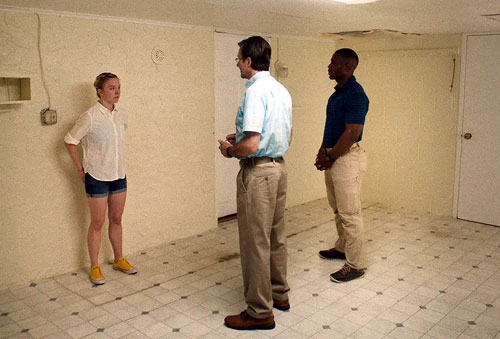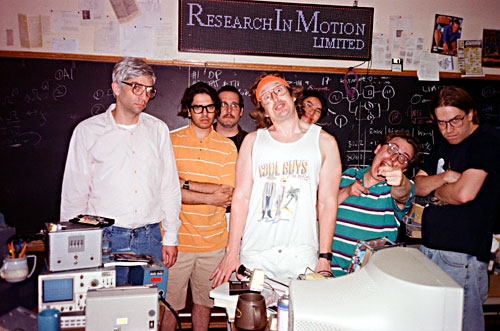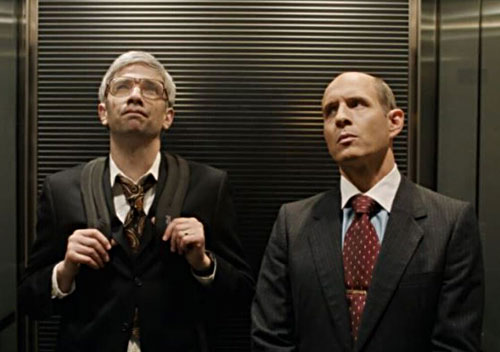|
Two recent and excellent movies—Tina Satter's Reality, on
Max,
and
Matt
Johnson's BlackBerry, available
for
rent
on
Prime,
Apple
TV+
and
other
platforms—depict
situations
in
which
the
protagonists
find
themselves
in
trouble
with
government
investigators.
In Reality, the
trouble
is
the
whole
story,
taking
place
almost
in
real
time,
as
FBI
agents
question
National
Security
Agency
contractor
Reality
Winner
about
her
alleged
leaking
of
a
classified
document.
In BlackBerry, the
government
trouble
(this
time
with
the
Securities
and
Exchange
Commission)
comes
toward
the
end,
after
more
than
a
decade
of
high-pressure
corporate
manipulation
at
Research
In
Motion
(RIM),
manufacturer
of
the
BlackBerry
cellular
telephone.
Reality—written by Satter and James Paul Dallas, based on Satter's play Is
This
A
Room—begins
on
May
9,
2017
with
a
brief
scene
of
Reality
Winner
(Sydney
Sweeney),
a
translator
of
Farsi
and
Pashto
at
the
NSA
facility
in
Augusta,
Ga.,
watching
at
her
office
a
Fox
News
story
about
President
Trump
firing
FBI
Director
James
Comey.
The
action
switches
to
June
3,
when
FBI
agents
follow
Winner
home
from
the
grocery
and
approach
her
outside
her
house.
From
this
point,
the
dialogue
is
taken
verbatim
from
actual
FBI
tapes
of
Winner's
interrogation.
Agents
Justin
Garrick
(Josh
Hamilton)
and
Wallace
Taylor
(Marchant
Davis)
ask
if
they
could
ask
her
a
few
questions,
and
also
if
they
may
search
her
house.
Winner
reacts
calmly
to
Garrick
and
Taylor's
requests,
although
she
is
worried
about
the
safety
of
her
pet
dog
and
cat.
The
questioning
begins
outside;
later,
after
agents
finish
searching
the
house
and
the
dog
and
cat
are
secured,
Garrick
and
Taylor
move
Winner
into
an
empty
room
indoors.
The
questioning
at
first
is
light,
almost
bantering;
she
talks
about
her
service
in
the
Air
Force,
her
yoga
and
her
Cross-Fit
training,
and
the
agents
share
stories
about
their
military
service
and
fitness
regimens.
Slowly
the
questions
become
more
pointed,
and
as
they
do,
Winner's
equanimity
fades, and the truth emerges.

That truth is appallingly sad. Winner is no Edward Snowden, much less a
Robert Hanssen. She is a patriot whose chief desire is to deploy to
Afghanistan where her expertise in Pashto can be used in her country's
service. Because she is a patriot, she felt she could not sit idly by and let
Fox News tell lies about Russian interference in the 2016 presidential
election when she had clear evidence in front of her. That is why she
printed out a classified document and mailed it to The Intercept.
It is evident that Winner and her interrogators have much more in common
than not. In Winner's place, would they have done what she did? We can
never know, but they all serve the same government, and they are all
motivated by love of country. The sad revelation of Winner is that the
system—especially when headed by dishonorable officials—finds them all
expendable. Satter finds an unforgettable visual way of underlining that
point; when Winner, Garrick or Taylor touch on any classified issue, the
soundtrack changes to electronic scribble, and their images are blanked
out.
Was Reality Winner justified in leaking that document? Reasonable people
can disagree, but Satter leaves us in no doubt where she stands. While
Winner was just beginning a four-year sentence in prison, a final caption
tells us, United States senators were quoting publicly from the document
she mailed The Intercept.
There is no room for people to disagree reasonably about the events in BlackBerry. Indeed, as the screenplay by Matt Johnson and Matthew
Miller demonstrates, reason had little to do with what happened to RIM
and its executives toward the end.
BlackBerry begins in Ontario in 1996, when RIM co-founders Mike
Lazaridis (Jay Baruchel) and Doug Fregin (Johnson) pitch their
"PocketLink" cellular device to manufacturing executive Jim Balsillie
(Glenn Howerton). Lazaridis, a techno-nerd, and Fregin, a laid-back
hippie, are inept at selling the product, and the hard-charging Balsillie can't
hide his annoyance. But after Balsillie is fired for insubordination, he
remembers intriguing details about the PocketLink and thinks he can make
it successful. He goes to Lazaridis and Fregin, offering cash in exchange for
50 percent of the company. At first Lazaridis and Fregin are dubious, but
after Balsillie exposes a plot by USRobotics to bankrupt RIM, they relent,
give him a third of the company, and make him co-CEO with Lazaridis.

Rechristened the BlackBerry, RIM's product is revolutionary in its day, a
combination telephone, pager, and messaging device. It is so innovative
that potential partners are difficult to persuade. It doesn't help that
Balsillie is completely out of sync with the RIM staff. Balsillie is the sort
who smashes pay phones in a fit of rage, whereas Lazaridis, Fregin and
their pals regularly stop work to watch Raiders of the Lost Ark and other
favorite movies. At one point Balsillie forces Lazaridis and his team to
work overnight to create a prototype to show Bell Atlantic executives in
New York the next morning. Balsillie hustles Lazaridis onto the plane, only
to find out that Lazaridis forgot the prototype.
No matter: by 2003, the BlackBerry is a roaring success, making Balsillie,
Lazaridis and Fregin rich. Soon, however, trouble comes in the form of
Carl Yankowski (Cary Elwes), the arrogant CEO of Palm Pilot, who
threatens a hostile takeover of BlackBerry. To ward off Yankowski,
Balsillie must sell millions of new units, but this exceeds the ability of
existing networks to handle them. Balsillie also hires new engineers and a
new COO, the Logan Roy-like Charles Purdy (Michael Ironside), promising
illegally backdated stock options. Purdy remakes the BlackBerry
workplace in his image, and also demands that future BlackBerries be built
in China—something Lazaridis had previously resisted because of inferior
workmanship.

A beaten-down Lazaridis agrees to all of this, to the horror of Fregin, who
until that point had considered Lazaridis his best friend. It is around this
time that the SEC starts asking questions about those illegally backdated
stock options, and that Steve Jobs unveils a little item called the iPhone...
Besides being a thrilling movie about recent technological history, BlackBerry is a wise parable about the vanity of human ambition.
Lazaridis and Fregin are the smartest guys in the room, and Balsillie the
world's greatest salesman—until they aren't. It is painful, and edifying, to
see Lazaridis and Balsillie in the film's final stretch, making promises to
customers and to each other that they know they can't keep. The end
shows Lazaridis with giant crates of defective BlackBerries from China,
trying to repair them one by one. Sic transit gloria.
|